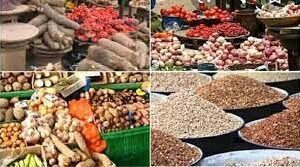Statistics has it that West Africa is a primary producer of agricultural commodities for both domestic consumption and exports. This presents an opportunity for the region to take advantage of the Africa Continental Free Trade Area agreement (AfCFTA) by investing massive in agriculture; JOHN OBA report.
The Food and Agriculture Organisation (FAO), has said that agriculture in West African is at a turning point. The combination of strong demand, sustained economic growth, higher global agricultural prices, and an improved policy environment has generated the most conducive condition for agricultural growth in over three decades.
The UN agency stated that West African countries and their development partners now clearly recognize the sector’s vital importance for broad-based growth, food security, improved nutrition and poverty reduction.
This has placed the region in a vintage position to take advantage of the Africa Continental Free Trade Agreement (AfCFTA).
This formed the major focus of 3rd Agriculture Budget Summit, which noted that if the ECOWAS sub region is to benefit from the agreement, there is urgent need for massive and unprecedented investment in the sector for domestic consumption, rural infrastructural development and export promotion for the region to take advantage of the opportunities the agreement offers.
Stakeholders at the summit that held in Abuja recently agreed that as the economic main stay of the region agriculture contributes an average of 25.6 per cent per year to GDP, while about 80 per cent of the regional population’s food needs (about 300 million persons) are disproportionately met by regional production.
Lack of political will
The summit observed that lack of political will and commitment to the Malabo declaration on minimum of 10 per cent of annual national budgets to agriculture which has negatively influenced overall performance (poverty, hunger & resilience to climate change). They added that there is an urgent need for massive and unprecedented investment in the sector for domestic consumption, rural infrastructural development and export promotion for West Africa to take advantage of the opportunities the agreement offers.
However, before investment in the sector could yield tangible results, there has to be an harmonious relationship between commodity market and free trade agreement while trade agreements should be built on the comparative advantages of individual countries.
The lack of political will can be seen in the inability of the leadership of various countries not only to meet the 10 per cent agriculture budget commitment but also to put mechanism in place to implement the 10 per cent budget commitment. This added to the low level of policy implementation at national level on the core issues of security, climate change, and hunger continues to worsen.
According to the communiqué from the summit, the sub-regional average between 2014 – 2018 was 6.6 per cent with Benin, Burkina Faso, Mali, Niger and Senegal being the only countries that backed their commitment with action which is seen in budget allocation to the agric sector. More countries need to improve in their investment and allocations to the sector in progressive manner.
The summit also noted that there have been little participatory budgetary processes among member states in the region leading to low accountability in funds allocated to the sector. It therefore, demanded citizens’ involvement in all stages of the budget cycles.
Budget funding still low
Speaking during his presentation, titled: “The State Of Public Financing Of Agriculture In The Ecowas Member States (2019 Report), the programme officer, ActionAid Nigeria, Mr Azubike Nwokoye, said Agricultural policies in ECOWAS are in complaint with Malabo Declaration but priorities and not leading to performance in the sector, and that most member states investments in agriculture over the years continues to have large recurrent budget line items instead of capital and the capital component never does 100 per cent.
Issues in 2020 budget
Stakeholders at the summit noted the need for urgent massive and unprecedented investment in the agriculture sector for domestic consumption, rural infrastructural development and export promotion to enable West Africa to take advantage of the opportunities the AfCFTA offers.
Mr. Azubuke noted that member states in the sub region have well-structured and articulated agricultural policy frameworks that are intended to accelerate agricultural growth and transformation for shared prosperity and improved livelihoods, including for smallholder farmers and women.
“What is perhaps needed is the political will and legislative oversight that would ensure that the ECOWAS Members States do not deviate from their commitment on allocation of minimum of 10% of government expenditure to agriculture
“Since 10% of annual budgetary allocation is the minimum, ECOWAS Member States should endure to increase this level of public investment in agriculture by providing complimentary funding mechanisms for catching up and for ensuring sustainable agricultural financing that would trigger the much-needed agricultural growth and transformation for shared prosperity and improved livelihoods in the sub-region,” he said.



